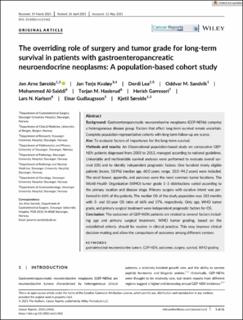| dc.contributor.author | Søreide, Jon Arne | |
| dc.contributor.author | Kvaløy, Jan Terje | |
| dc.contributor.author | Lea, Dordi | |
| dc.contributor.author | Sandvik, Oddvar M. | |
| dc.contributor.author | Al-Saiddi, Mohammed | |
| dc.contributor.author | Haslerud, Torjan M. | |
| dc.contributor.author | Garresori, Herish | |
| dc.contributor.author | Karlsen, Lars Normann | |
| dc.contributor.author | Gudlaugsson, Einar | |
| dc.contributor.author | Søreide, Kjetil | |
| dc.date.accessioned | 2021-08-06T07:23:19Z | |
| dc.date.available | 2021-08-06T07:23:19Z | |
| dc.date.created | 2021-07-15T18:05:39Z | |
| dc.date.issued | 2021-06 | |
| dc.identifier.citation | Søreide, J.A., Kvaløy, J.T., Lea, D. et al. (2021) The overriding role of surgery and tumor grade for long-term survival in patients with gastroenteropancreatic neuroendocrine neoplasms: A population-based cohort study. Cancer Reports, 2021;e1462. | en_US |
| dc.identifier.issn | 2573-8348 | |
| dc.identifier.uri | https://hdl.handle.net/11250/2766593 | |
| dc.description.abstract | Background
Gastroenteropancreatic neuroendocrine neoplasms (GEP-NENs) comprise a heterogeneous disease group. Factors that affect long-term survival remain uncertain. Complete population-representative cohorts with long-term follow-up are scarce.
Aim
To evaluate factors of importance for the long-term survival.
Methods and results
An Observational population-based study on consecutive GEP-NEN patients diagnosed from 2003 to 2013, managed according to national guidelines. Univariable and multivariable survival analyses were performed to evaluate overall survival (OS) and to identify independent prognostic factors. One hundred ninety eligible patients (males, 58.9%) (median age, 60.0 years; range, 10.0–94.2 years) were included. The small bowel, appendix, and pancreas were the most common tumor locations. The World Health Organization (WHO) tumor grade 1–3 distributions varied according to the primary location and disease stage. Primary surgery with curative intent was performed in 66% of the patients. The median OS of the study population was 183 months with 5- and 10-year OS rates of 66% and 57%, respectively. Only age, WHO tumor grade, and primary surgical treatment were independent prognostic factors for OS.
Conclusion
The outcomes of GEP-NEN patients are related to several factors including age and primary surgical treatment. WHO tumor grading, based on the established criteria, should be routine in clinical practice. This may improve clinical decision-making and allow the comparison of outcomes among different centers. | en_US |
| dc.language.iso | eng | en_US |
| dc.publisher | John Wiley & Sons Ltd. | en_US |
| dc.rights | Navngivelse 4.0 Internasjonal | * |
| dc.rights.uri | http://creativecommons.org/licenses/by/4.0/deed.no | * |
| dc.subject | kreft | en_US |
| dc.subject | GEP-NEN | en_US |
| dc.subject | kirurgi | en_US |
| dc.title | The overriding role of surgery and tumor grade for long-term survival in patients with gastroenteropancreatic neuroendocrine neoplasms: A population-based cohort study | en_US |
| dc.type | Peer reviewed | en_US |
| dc.type | Journal article | en_US |
| dc.description.version | publishedVersion | en_US |
| dc.rights.holder | © 2021 The Authors. | en_US |
| dc.subject.nsi | VDP::Medisinske Fag: 700::Klinisk medisinske fag: 750::Onkologi: 762 | en_US |
| dc.source.pagenumber | 1-11 | en_US |
| dc.source.journal | Cancer Reports | en_US |
| dc.identifier.doi | 10.1002/cnr2.1462 | |
| dc.identifier.cristin | 1921901 | |
| dc.source.articlenumber | e1462 | en_US |
| cristin.ispublished | true | |
| cristin.fulltext | original | |
| cristin.qualitycode | 1 | |

